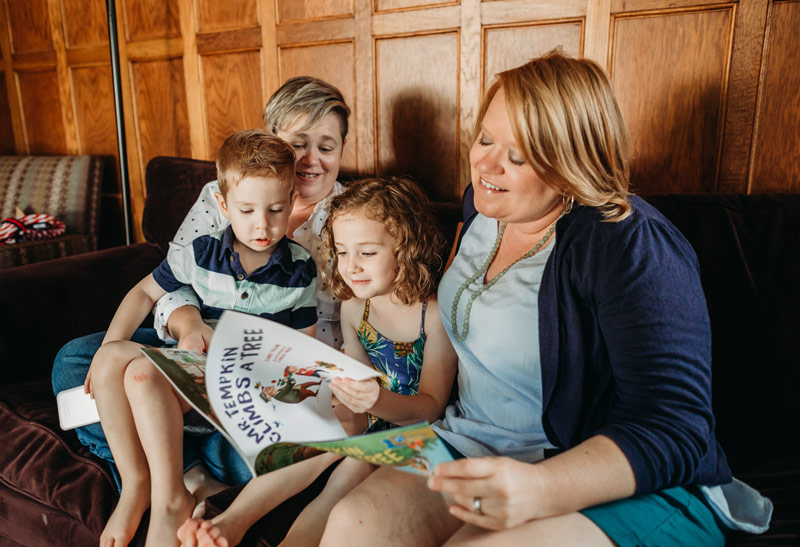
Many stories withstand the test of time because their messages and meanings carry moral significance that transcends time. Some of those stories — folktales — may have been told and retold for generations.
It is not uncommon for children’s book authors and illustrators to use popular folktales as the basis for their stories. PJ Library has certainly mailed out its fair share of folktale-based children’s book. While the stories’ characters, locations, or details differ from oral tradition, their moral lessons remain true to the tales’ original values.
Related: Have I Got a Story For You
Folktales & PJ Library Books
Below are several examples of PJ Library books that retell the same classic folktale. While the characters, location, or particulars of each book may be unique, their stories are the same.
Appreciating What You Have
Here are three books that share the same Yiddish tale:
What should you do when you live in a very small house filled with children -- and lots of clutter? In this retelling of an classic Yiddish folktale, one family gets some very odd advice...that turns out to be exactly right.
In this beloved tale from Eastern Europe, a distraught man discovers a positive attitude for dealing with the overcrowding in his small home.
In this contemporary take on a beloved Jewish folktale, a rabbi helps Abigail discover the wonderful aspects of her newly-blended family.
Looking for a new take on this classic tale? Check out the episode, Moon Station One, of PJ Library's new podcast, Have I Got A Story For You!
The Power of Community & Sharing
Certainly, we all know “Stone Soup.” So, how about these original retellings?
In this gentle retelling of the Stone Soup tale, an imaginative beggar teaches the miserly residents of a shtetl the spirit of community.
How can you make a huge pot of delicious matzoh ball soup when all you’ve got is a cold, hard stone? In Chelm, anything can happen -- and does.
Using Smarts to Solve Problems
There is a version of “The Wooden Sword” in the collection of short stories, The Hungry Clothes. Read both iterations of the story, and decide whether you have a favorite.
Here are 22 Jewish tales, some told with humor and all sure to inspire conversation. Each story contains a message that resonates with Jewish values.
Disguised as a servant, an Afghani shah slips out of his palace to get to know his people. When he encounters a poor Jewish shoemaker full of faith that everything will turn out just as it should, he decides to test that faith. Will the shoemaker's cheerful optimism be shaken when faced with a matter of life and death?
Being Honest
What happens when a little girl finds a chicken? These two books can tell you.
What’s a girl to do when she finds a chicken and can’t return it to its owner? How long should she wait before calling the bird (and its many offspring!) her own? Shaina seems prepared to wait forever for Izzy Pippik to return.
When Leora finds a chicken in her front yard, she imagines keeping it; her mother has a very different view. Following a Jewish law that “finders aren’t keepers,” the family will care for the chicken until its rightful owner returns. After all, how much trouble can one little chicken be?
Generosity
A promise of sibling caring is captured in the two versions of this Talmudic story.
In this poignant retelling of a Talmudic story, siblings recall the promise each lovingly made to his father.
Based on a folktale told by both Jews and Arabs, this story is of two brothers quietly and lovingly caring for each other. The place where they meet is said by some to have been chosen as the site of Jerusalem.
Tikkun Olam (Repairing the World)
Where did the stars come from? And what can we learn about caring for the world? This classic tale, told two different ways, shows us.
“Where did all the stars come from?” A grandfather offers an age-old Jewish explanation to his granddaughter and, in the process, teaches her about tikkun olam (repairing the world).
Light Jane Breskin Zalben
According to a sixteenth-century legend, when the world began the Creator intended to add sparks of light to all creation. Held in a vessel that broke apart, the sparks scattered. The task of people is to gather the sparks and contain them once again, thus repairing our imperfect world. Light is a mythical, poetic retelling of this story.
Indeed, folktales continue to evolve. Can your family re-interpret the lessons and significance of these stories to fit your family’s contemporary experiences?
July 10, 2014